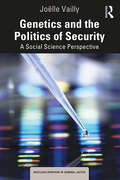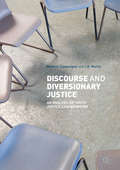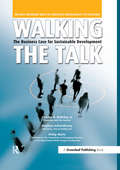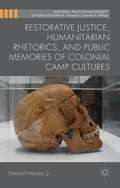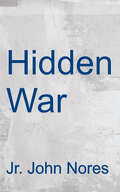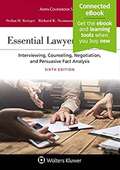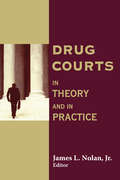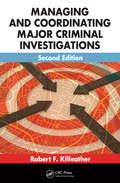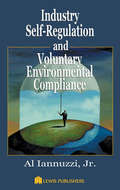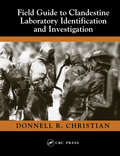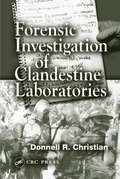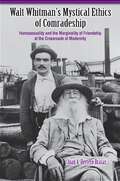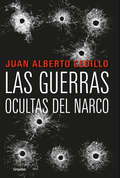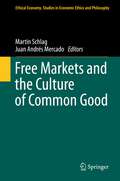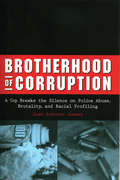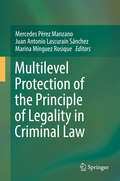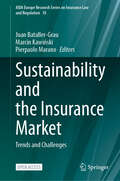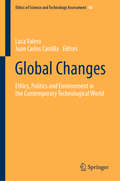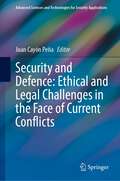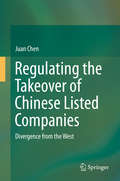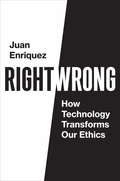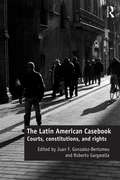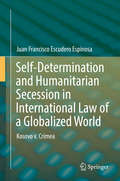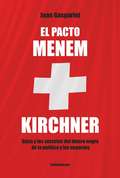- Table View
- List View
Genetics and the Politics of Security: A Social Science Perspective (Routledge Frontiers of Criminal Justice)
by Joëlle VaillyPresenting a social science perspective on the contemporary gaze on the body of the suspect, this book considers how definitions of criminality, offenses, individual rights, and the concepts of identity and difference have been altered by changes in the biological status of the human.Spurred by rapid developments in genetics and information technology, a number of countries, including France, the United States, the United Kingdom, China, and the Netherlands, have considerably expanded their genetic databases used by the police and the criminal justice system. Whilst this makes it possible to compare DNA left at the scene of a crime with that of an individual known to the police, helping to identify individuals for the purposes of court proceedings, these innovations also raise a number of important questions, such as how the relationship between respect for the rights of individuals and the security of populations is discussed, as well as for how long this data should be retained. Genetic analysis also raises concerns related to phenotyping and “biogeographical origin” that could lead to the stigmatization of targeted groups.Offering a comprehensively argued view on how DNA acts not only as a tracker of suspicion but also as a marker of contemporary social developments, Genetics and the Politics of Security will appeal to students and scholars, judiciary personnel, lawyers, police officers, and people with an interest in criminology and the use of genetics in the criminal justice process.
Discourse and Diversionary Justice
by Michele Zappavigna Jr MartinThis book analyses the Youth Justice Conferencing Program in New South Wales, Australia. Exploring this form of diversionary justice from the perspectives of functional linguistics and performance studies, the authors combine close textual analysis with ethnographic research methodologies. They examine how participants use the discourse semantic resources available to them to achieve such outcomes as reparation for the victim, reintegration of the offender into the community, and reconciliation between the various parties. This uniquely-researched work is sure to be of interest to students and scholars of applied linguistics, sociolinguistics and discourse analysis.
Walking the Talk: The Business Case for Sustainable Development
by Philip Watts Jr, Charles Holliday Stephan SchmidheinyThe authors argue the business case for sustainable development in this study that explores a range of issues beginning with corporate social responsibility and ending with eco-efficiency.
Restorative Justice, Humanitarian Rhetorics, and Public Memories of Colonial Camp Cultures
by Jr. Marouf HasianThe concentrations camps that existed in the colonised world at the turn of the 20th Century are a vivid reminder of the atrocities committed by imperial powers on indigenous populations. This study explores British, American and Spanish camp cultures, analysing debates over their legitimacy and current discussions on retributive justice.
Hidden War: How Special Operations Game Wardens are Reclaiming America's Wildlands from the Drug Cartels
by Jr. John NoresDANGER On Your Public Lands! Death stalks America's wildlands. Indiscriminate destroyers of people, wildlife, and the environment, cartel marijuana growers will do anything to supply the black-market demand for weed. HIDDEN WAR, 2nd Edition, exposes this threat, give you a rare, inside glimpse into the operations of specially trained tactical teams with the California Department of Fish & Wildlife to infiltrate and take down these groups. In this updated and revised second edition of his popular 2019 book, Lt. John Nores, Jr., provides a sobering look at crimes against people and the environment on public lands as clandestine crime organizations and special forces game wardens go to war in a struggle that cuts across political ideologies about marijuana legalization.
Essential Lawyering Skills: Interviewing, Counseling, Negotiation, and Persuasive Fact Analysis (Aspen Coursebook Series)
by Stefan H. Krieger Jr. Neumann Renee McDonald HutchinsThe Sixth Edition of Essential Lawyering Skills: Interviewing, Counseling, Negotiation, and Persuasive Fact Analysis continues to emphasize the role of the attorney in the lawyer-client relationship. Widely respected practitioners and teachers, the authors’ introductions, visual aids, and realistic examples illuminate the basic mechanics of these key skills. Case situations and problem-solving scenarios engage students in developing essential lawyering skills that mirror legal practice.The topic of professional responsibility is integrated throughout. <p><p> New to the Sixth Edition: <p> New co-author René Hutchins brings her new perspective to the course <p>Updated and improved design makes the material more accessible for today’s student <p>Increased coverage of negotiation in the plea-bargaining context <p>Updated examination of the use of electronic media in fact analysis and negotiation <p><p>Professors and students will benefit from: <p> <p>An emphasis on practice and the mechanics of negotiation and persuasion, rather than on theory <p>Complete coverage of problem solving, interviewing, counseling, negotiation, and fact analysis <p>Remarkably clear and penetrating discussion of the persuasive value of facts, supported by useful visual aids <p>Generous use of interesting examples that place topics in context <p>Integrated coverage of professional responsibility where appropriate <p>Experienced authors, who draw upon many years of teaching and writing about lawyering skills
Drug Courts: In Theory and in Practice (Social Problems And Social Issues Ser. #14)
by Jr. NolanDrug courts offer offenders an intensive court-based treatment program as an alternative to the normal adjudication process. Begun in 1989, they have since spread dramatically throughout the United States. In this interdisciplinary examination of the expanding movement, a distinguished panel of legal practitioners and academics offers theoretical assessments and on-site empirical analyses of the workings of various courts in the United States, along with detailed comparisons and contrasts with related developments in Britain. Practitioners, politicians, and academics alike acknowledge the profound impact drug courts have had on the American criminal justice system. From a range of disciplinary perspectives, contributors to this volume seek to make sense of this important judicial innovation. While addressing a range of questions, Drug Courts also aims to achieve a careful balance between focused empirical studies and broader theoretical analyses of the same phenomenon. The volume maintains an analytical concentration on drug courts and on the important practical, philosophical, and jurisprudential consequences of this unique form of therapeutic jurisprudence.Drug courts depart from the practices and procedures of typical criminal courts. Prosecutors and defense counsel play much-reduced roles. Often lawyers are not even present during regular drug court sessions. Instead, the main courtroom drama is between the judge and client, both of whom speak openly and freely in the drug court setting. Often accompanying the client is a treatment provider who advises the judge and reviews the client's progress in treatment. Court sessions are characterized by expressive and sometimes tearful testimonies about the recovery process, and are often punctuated with applause from those in attendance. Taken together, the chapters provide a variety of perspectives on drug courts, and extend our knowledge of the birth and evolution of a new movement. Drug Courts<
Managing and Coordinating Major Criminal Investigations
by Robert F. Kilfeather Jr. Robert P.The process of controlling criminal investigations is a complex matter, yet it has frequently been minimized or neglected in police management publications. But knowing how to properly plan for an event, make resource agreements with other participants in the investigation, and implement a coordinating system within the agency is critical to proper
Industry Self-Regulation and Voluntary Environmental Compliance
by Jr., Al IannuzziWhy self-regulation? With the advent of such concepts as design for the environment, industrial ecology, and the recognized enlightened self-interest that voluntary compliance brings, it is in any company's best interest to avoid fines, liabilities, and bad publicity. Consumer concern and pressure from the marketplace give a competitive advantage t
Field Guide to Clandestine Laboratory Identification and Investigation
by Jr., Donnell ChristianThis book provides information for field use along with reproducible worksheets for crime scene investigators. It presents a list of the chemicals commonly encountered in clandestine laboratories and includes information about chemical hazards and the personal protective equipment required.
Forensic Investigation of Clandestine Laboratories
by Jr., Donnell ChristianClandestine lab operators are not the mad scientists whose genius keeps them pent up in the laboratory contemplating elaborate formulas and mixing exotic chemicals. In fact, their equipment is usually simple, their chemicals household products, and their education basic. Most of the time the elements at the scene are perfectly legal to sell and own
Walt Whitman's Mystical Ethics of Comradeship: Homosexuality and the Marginality of Friendship at the Crossroads of Modernity
by Juan A. Hererro BrasasA giant of American letters, Walt Whitman is known both as a poet and, to a lesser extent, as a prophet of gay liberation. This revealing book recovers for today's reader a lost Whitman, delving into the original context and intentions of his poetry and prose. As Juan A. Herrero Brasas shows, Whitman saw himself as a founder of a new religion. Indeed, disciples gathered around him: the "hot little prophets" as they came to be called by early biographers.Whitman's religion revolved around his concept of comradeship, an original alternative to the type of competitive masculinity emerging in the wake of industrialization and nineteenth-century capitalism. Shedding new light on the life and original message of a poet who warned future generation of treating him as a literary figure, Herrero Brasas concludes that Whitman was a moral reformer and grand theorist akin to other grand theorists of his day.
Las guerras ocultas del narco
by Juan Alberto CedilloHasta hoy, lo peor de la "guerra antinarco" ha permanecido casi en el silencio o en el terreno del rumor: el grado real de brutalidad, la lógica de los pactos, la crónica de las masacres, la explicación de los ataques... Mediante una investigación documental profundísima y un reporteo riguroso, Juan Alberto Cedillo ofrece una investigación inaudita que trae luz sobre estos fenómenos y aclara preguntas fundamentales de la lucha que desgarra, con saña particular, el norte de México. La base de estas historias son los propios testimonios de los capos, ofrecidos en México y Estados Unidos. Sus relatos explican una de las mayores heridas del país, al tiempo que desmontan algunos de los mitos más arraigados en torno al narcotráfico y los cárteles. "Gracias a que no serían juzgados por los asesinatos que cometieron en México, cuando los capos tuvieron la oportunidad de narrar sus andanzas, se explayaron al grado que los fiscales los tenían que callar..."
Free Markets and the Culture of Common Good
by Juan Andrés Mercado Martin SchlagRecent economic development and the financial and economic crisis require a change in our approach to business and finance. This book combines theology, economy and philosophy in order to examine in detail the idea that the functioning of a free market economy depends upon sound cultural and ethical foundations. The free market is a cultural achievement, not only an economic phenomenon subject to technical rules of trade and exchange. It is an achievement which lives by and depends upon the values and virtues shared by the majority of those who engage in economic activity. It is these values and virtues that we refer to as culture. Trust, credibility, loyalty, diligence, and entrepreneurship are the values inherent in commercial rules and law. But beyond law, there is also the need for ethical convictions and for global solidarity with developing countries. This book offers new ideas for future sustainable development and responds to an increasing need for a new sense of responsibility for the common good in societal institutions and good leadership.
Brotherhood of Corruption: A Cop Breaks the Silence on Police Abuse, Brutality, and Racial Profiling
by Juan Antonio JuarezA former Chicago cop exposes shocking truths about the abuses of power within the city's police department in this memoir of violence, drugs, and men with badges. Juarez becomes a police officer because he wants to make a difference in gang-infested neighborhoods; but, as this book reveals, he ends up a corrupt member of the most powerful gang of all--the Chicago police force. Juarez shares the horrific indiscretions he witnessed during his seven years of service, from the sexually predatory officer, X, who routinely stops beautiful women for made-up traffic offenses and flirts with domestic violence victims, to sadistic Locallo, known on the streets as Locoman, who routinely stops gang members and beats them senseless. Working as a narcotics officer, Juarez begins to join his fellow officers in crossing the line between cop and criminal, as he takes advantage of his position and also becomes a participant in a system of racial profiling legitimized by the war on drugs. Ultimately, as Juarez discusses, his conscience gets the better of him and he tries to reform, only to be brought down by his own excesses. From the perspective of an insider, he tells of widespread abuses of power, random acts of brutality, and the code of silence that keeps law enforcers untouchable.
Multilevel Protection of the Principle of Legality in Criminal Law
by Mercedes Pérez Manzano Juan Antonio Lascuraín Sánchez Marina Mínguez RosiqueThis book examines the simultaneous protection of fundamental rights by various norms and jurisdictional organs, focussing on the multilevel protection of the principle of legality in Criminal Law.Written by accredited specialists in criminal law, constitutional law, international public law, and the philosophy of law, the majority of them ex-Counsels of the Spanish Constitutional Court, it addresses various manifestations of the principle of legality: the requirement of precision, the judicial subjection to law and the prohibition of bis in idem. It does so not only from a theoretical perspective, but also through a comparative study of the jurisdiction of the European Court of Human Rights, the Inter-American Court of Human Rights, the Court of Justice of the European Union and state constitutional courts. This practical approach characterizes the book, which culminates in a detailed analysis of the relevant ECtHR Judgement Del Río Prada v. Spain on the retroactivity of unfavourable jurisprudence."Multilevel protection of the principle of legality in Criminal Law" is a useful instrument of reflection for scholars of both the principle of criminal legality and the problems that arise from the concurrency of protective jurisdictions of human rights.
Sustainability and the Insurance Market: Trends and Challenges (AIDA Europe Research Series on Insurance Law and Regulation #10)
by Pierpaolo Marano Juan Bataller-Grau Marcin KawińskiThis open access book focuses on the regulatory framework for the sustainability of the insurance market. It analyzes its potential impact on insurance undertakings governance and product design. The book is structured into three parts. It firstly explores the general framework on the sustainability for the insurance market, focusing on the regulation at the European Union level. Secondly, it examines sustainability and insurers' governance, including topics like sustainable investments and ESG factors. Finally, the book turns to sustainability and insurance products, addressing agricultural insurance systems and pensions. The book is aimed at academics, policymakers, and professionals in the insurance sector.
Global Changes: Ethics, Politics and Environment in the Contemporary Technological World (Ethics of Science and Technology Assessment #46)
by Luca Valera Juan Carlos CastillaThis book offers an authoritative analysis of the challenges that have arisen as a result of modern technologies. It covers several environmental problems, such as climate change, overexploitation of natural resources, loss of natural habitats, pollution and human population growth, and discusses practical scenarios for sustainable human dwelling of our planet. Adopting an interdisciplinary approach, the first part introduces “global changes”, describing how they are happening in reality, and the challenges arising from them. The second part introduces methodological approaches borrowed from various disciplines, such as engineering, management science, philosophy and theology, which can help deal with the contemporary challenges resulting from global changes. Lastly, the third part discusses some of the themes presented in the light of novel concepts, such as the Anthropocene, and includes interesting proposals and ideas about how human beings could dwell the Earth in this new age. Offering a comprehensive theoretical reflection on the relation between technology, environment and human beings, it also provides a practice-oriented guide for researchers and decision-makers working on a new ethical paradigm of acting in the Anthropocene.
Security and Defence: Ethical and Legal Challenges in the Face of Current Conflicts (Advanced Sciences and Technologies for Security Applications)
by Juan Cayón PeñaThis book aspires to face the challenge of analyzing with due academic rigor, always in the paradigm of security and advanced sciences, but without forgetting the ethical questions that our world raises every day. The work is divided into two main sections: the first section is focused on the cyber world, with not only technical but also legal derivations given the expansion of vulnerabilities and our technological dependence. The second section, with a more interdisciplinary nature, runs through undeniably topical issues such as territorial problems and the potential decline of the traditional States, the communicational impact of information management and false news, or the commitment to essential freedoms for the West. This book connects advanced technologies and ethical issues and includes discussions on recent crises such as COVID-19. It also provides an interdisciplinary view on the ethical issues for security technologies.
Regulating the Takeover of Chinese Listed Companies
by Juan ChenThis book provides a comprehensive review of the Measures for Administration of Takeover of Chinese Listed Companies (the Chinese takeover law), with emphasis on the differences between the Chinese takeover law and takeover legislation in the UK, the US and Hong Kong. The Chinese M&A market has been booming at an unprecedented rate in recent years; not only domestic investors, but also foreign funds and multinational companies are actively participating on the market. For both market participants and researchers, it is crucial to understand the emerging and transitional aspects of the Chinese economy and its M&A market, and the impacts of those aspects on relevant laws. While there are ongoing academic discussions on the convergence between the Chinese takeover law and its counterparts in the UK, Hong Kong and the US, this book offers a comprehensive discussion of the divergence and focuses on key differences in the transplanted Chinese takeover law.
Right/Wrong: How Technology Transforms Our Ethics
by Juan EnriquezFrom the TED stage to the page, Juan Enriquez, author of As the Future Catches You and Evolving Ourselves, presents a lively and engaging guide to ethics in a technological age.Most people have a strong sense of right and wrong, and many of us are not reluctant to argue with someone who disagrees. But when we take an unyielding stand on something we regard as an eternal truth, we forget that ethics evolve over time. What was once broadly acceptable is now completely unacceptable. For example, burning heretics is no longer considered a just punishment. Child marriage is not applauded as a family value. Many shifts in the right vs. wrong pendulum are affected by advances in technology. In Right/Wrong, Juan Enriquez reflects on the evolution of ethics in a technological age.
Transitional Justice after German Reunification
by Juan EspindolaHow do societies transitioning from oppressive to democratic rule hold accountable those citizens who contributed to maintaining injustice in the ancient regime by secretly denouncing fellow citizens? Is their public identification a way of fulfilling respect for those who suffered harm as a result of their collaboration? And is public identification respectful of denunciators themselves? This book pursues these questions through a multidisciplinary investigation focusing on the denunciators for the East German secret police and the Ministry of State Security and the way in which they have been publicly unveiled in contemporary German society. The book evaluates the justifications that social actors offer to support or oppose public identifications; how targeted collaborators react to this social practice; and whether it achieves its intended purpose. At every stage, the book asks whether the motivations and the consequences of public identifications honor or undermine the value of respect for people.
The Latin American Casebook: Courts, Constitutions, and Rights
by Roberto Gargarella Juan F. Gonzalez-BertomeuTraditionally relegated because of political pressure and public expectations, courts in Latin America are increasingly asserting a stronger role in public and political discussions. This casebook takes account of this phenomenon, by offering a rigorous and up-to-date discussion of constitutional adjudication in Latin America in recent decades. Bringing to the forefront the development of constitutional law by Latin American courts in various subject matters, the volume aims to highlight a host of creative arguments and solutions that judges in the region have offered. The authors review and discuss innovative case law in light of the countries’ social, political and legal context. Each chapter is devoted to a discussion of a particular area of judicial review, from freedom of expression to social and economic rights, from the internalization of human rights law to judicial checks on the economy, from gender and reproductive rights to transitional justice. The book thus provides a very useful tool to scholars, students and litigants alike.
Self-Determination and Humanitarian Secession in International Law of a Globalized World: Kosovo V. Crimea
by Juan Francisco Escudero EspinosaThis book addresses questions in connection with the international legal regime on demands for secession, which have arisen in various States. More specifically, it examines the unilateral declarations of independence by Kosovo in 2008, and by Crimea and its subsequent annexation by the Russian Federation in 2014. The work investigates the two cases so as to shed light on the international legal regime affecting entities that are smaller than a sovereign State. It analyzes the relevant principles of international law, the intention being to determine their scope and review them in light of the most recent practice and developments in international law. In turn, the book examines and explains the events of relevance for international law that occurred in the changing situations in Kosovo and Crimea. On the basis of these legal considerations, it explores how the international community can respond when faced with situations that may violate international law, together with the effectiveness of various measures. It also discusses whether certain situations might be legitimate as a concept could now be emerging that secession may be justified in specific circumstances, such as serious and widespread violations of basic human rights.
El pacto Menen- Kirchner: Suiza y los secretos del dinero negro de la política y los negocios
by Juan GaspariniEl pacto suizo de no agresión entre Carlos Saúl Menem y Néstor Kirchnerflorece en este libro impecablemente documentado, en el que se revela lamatriz helvética de las coimas y una red de corrupción internacional. ¿En qué se parecen escándalos como los de Thales, Skanska, Siemens,Alstom y el tren bala, la cuenta suiza de Menem, el Valijagate o losfondos de Santa Cruz? ¿Existe un patrón de comportamiento entreempresas, actores políticos y del ámbito judicial? ¿Son, todos ellos,piezas de un sistema coercitivo que hacen a la impunidad argentina enestos veinticinco años de democracia?Más allá de mutuas críticas ideológicas y de supuestos odios políticos,ambos ex presidentes han decidido, al menos con los dineros suizos, nopasar a mayores, evitar la confrontación.Por encima de convenciones internacionales, de reglamentos y de órganosde control, las firmas trasnacionales no han abandonado la estrategia desobornar para competir en los mercados. Esta investigación periodísticamuestra cómo funcionan, dentro y fuera del país, las grandes coimas, ydesnuda un hecho que, aun estando al alcance de la mano, la justiciaprefiere ignorar: la red de la corrupción internacional y suscomplicidades vernáculas no solo no se ha alterado, sino que se hanfortalecido en las últimas décadas.
